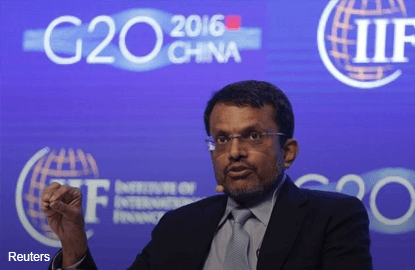
SINGAPORE (Aug 24): Even as the Monetary Authority of Singapore (MAS) tries to grow the emerging fintech sector, it is recognising that regulators such as themselves can pick up a new skill or two in keeping pace with changes within the financial industry.
Besides making sure that new forms of payment systems — a popular area being explored by fintech start-ups — work well, MAS also sees potential in using technology to keep a closer eye on areas such as anti-money laundering.
“We are thinking a lot about data analytics to support our work, in supervision, in surveillance,” says MAS's Managing Director Ravi Menon on Aug 24.
Within MAS, there is a growing awareness that technology is going to be an increasingly important part of everybody’s jobs, and the financial regulatory authority is spending more time thinking about how to use technology to supervise and regulate better, he adds.
MAS and other Singapore authorities have been investigating shady transactions carried out by Swiss private bank BSI, purportedly on behalf of 1Malaysia Development Berhad (1MDB). Former BSI banker Yeo Jiawei will face trial from Oct 31, while five other BSI employees, current or former, are under investigation.
Last month, Menon had noted that money laundering is an increasingly sophisticated activity, and one that regulators like MAS are facing with growing frequency.
The regulator wants to tap into data analytics to boost MAS’s capabilities in “know your client” monitoring or anti-money laundering type of risks, otherwise known in industry parlance as “reg-tech”. These could possibly be created in conjunction with fintech start-ups.
For example, data collection and subsequent submission to MAS can be made more “seamless” and formatted in a way that will be more useful to both the banks themselves and to MAS.
“Data submission is a real pain for both you and for us. It comes in all kinds of forms, forms that we can't use very well. Sometimes, the impositions we place on you do not tally with the way you run your own businesses. We got to fix all these,” says Menon.
“By exploiting data, that means we need to know enough about these areas,” says Menon, speaking at the opening of MAS’s own fintech lab. Located within MAS’s premises, the lab is dubbed the “Looking Glass”.
“Some of you are obviously overdressed for the lab,” says Menon to laughter. “The next time we see you, we hope to see you in appropriate attire.”
In attendance at Menon’s “fireside chat”, moderated by UOB’s Head of Group Channels and Digitalisation Janet Young, were bankers wearing their typical suits, including DBS CEO Piyush Gupta, and Deutsche Bank’s Chief Country Officer Philip Lee.
Menon also readily acknowledges that the lab, as defined by the name, is an “experiment”.
“We are not sure how it going to go but we thought we should try,” he says.
Menon notes that MAS’s lab will be a “very strong signal” to give industry players “the sense of comfort” that the regulator is doing its part in trying to bring everybody together.
He is quick to point out that although there are many such labs already set up by other banks and financial institutions, MAS can focus more on start-ups that have gone beyond the conceptualising and prototyping stages.
“If you want to do sandbox, regulatory compliance issues, you want to converse with MAS, you want to converse with lawyers for instance, this is a good place to come and test,” he says. MAS has been using the analogy of the sandbox to describe its approach to regulating fintech, where players are given the room to experiment.
Menon also agreed that the entire fintech sector is facing a manpower challenge, and that Singapore has an additional challenge in having a large financial sector with a small population. Coupled with tighter employment permits for foreign hires, the challenge can be especially pronounced. He also acknowledges that applications for foreign hires is now taking a longer time to process.
He says MAS has been holding regular discussions with the Ministry of Manpower, which controls the tap. However, Menon reiterates the overall Singapore policy of striking a balance between allowing foreign hires versus making sure locals are not displaced.
“We want the best in those fields to come here, and at the same time, an equally important part of the agenda is to grow a local pipeline,” he says.
“So the proposition that we have is, increasingly, if we need to get something off the ground and start it, and the talent is not available here, then we get it from abroad. But, over time there must be a plan to localise this,” he says. “We are trying to find a balance, and we need the inputs and feedback from the industry on a continuous basis to make sure we get the balance right.”